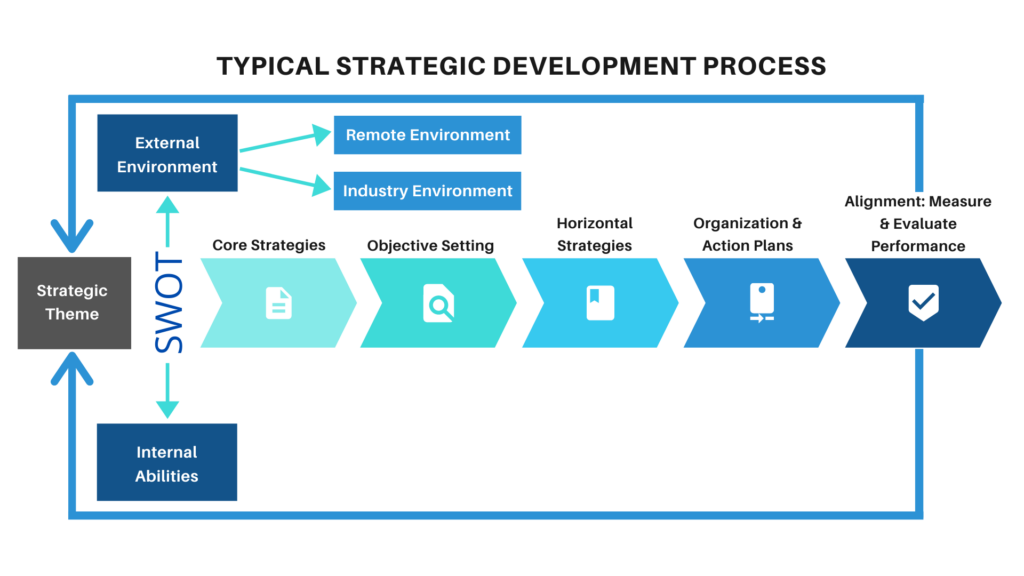We have come so accustomed to the new normal that calling it our “new” normal seems to be an oxymoron. Despite the challenges we have faced, this is our normal, and as always, we must plan effectively and strategically. With this, we have an opportunity to look at our current strategic planning processes and innovate the way we plan.
A Case Against SWOT Analysis
Traditionally, strategic planning is usually done using the process laid out in the chart below.

It is common practice to begin the strategic planning process with a SWOT analysis, where we look at strengths, weaknesses, opportunities, and threats. Then we consider the external environment and the internal abilities to identify core strategies, set objectives, look at the horizontal strategies, and create action plans. After the plans are put in place, an organization will measure their results, which feeds back to the strategic theme and forms a strategic planning cycle.
Although the SWOT process is helpful, it also has its limitations. Often, during the SWOT process, participants will focus too heavily on the weaknesses and threats. It is normal for participants to adopt a warfare mentality during a conversation on threats and to frame competition as an enemy. When covering the weaknesses aspect of the SWOT, participants will then concentrate on an organization’s deficits, which leads to a mentality of scarcity. The dilemmas commonly created through this process are false dilemmas that cause leadership to undervalue an organization’s potential.
Appreciative Inquiry Improves Organizations
When an organization shifts its analysis to focus on an organization’s strengths, we can conduct an appreciative inquiry. Appreciative inquiry is the co-evolutionary search for the best in people, their organizations, and the relevant world around them. It is rooted in radical social constructionism, appreciation, and positive imagery’s generative power, concentrating on positive means and methods rather than deficit-based, curative actions.
Appreciative inquiry is a transformational change process that focuses on improving existing organizational processes and challenging established belief systems through sharing of new ideas and knowledge; in essence, to change how people think rather than what people do. Appreciative inquiry is a way of thinking about the world around us with constructivist ideas. It is a philosophy of seeing the possibilities in life, of seeing the glass half full.
Conducting a SOAR Analysis
Appreciative inquiry employs a SOAR analysis: Strengths, Opportunities, Aspirations, and Results. Download our template for conducting a SOAR analysis here.
Over our many years of conducting SOAR analyses with our clients and internally, we have found that it builds momentum, excitement, and a renewed energy for the future. Here is a look at the questions you will ask yourself and your team to conduct a SOAR analysis.
Strengths
- What are we most proud of as an organization?
- What makes us unique?
- What is our proudest achievement in the last year or two?
- How do we use our strengths to get results?
- How do our strengths fit with the realities of the marketplace?
- What do we do or provide that is world-class for our customers, our industry, and other potential stakeholders?
Opportunities
- How do we make sense of opportunities provided by external forces & trends?
- What are the top three opportunities on which we should focus our efforts?
- How can we best meet the needs of our stakeholders?
- Who are possible new customers?
- How can we distinctively differentiate ourselves from existing or potential competitors?
- What are potential new markets, products, services, or processes?
- How can we reframe challenges to be seen as exciting opportunities?
- What new skills do we need to move forward?
Aspirations
- When we explore our values and aspirations, “what are we deeply passionate about?”
- Reflecting on our Strengths and Opportunities conversations, who are we, who should we become, and where should we go in the future?
- What is our most compelling aspiration?
- What strategic initiatives (projects, programs, and processes) would support our aspirations?
Results
- Considering our Strengths, Opportunities, and Aspirations, what meaningful measures would indicate that we are on track to achieving our goals?
- What are 3-5 indicators that would create a scorecard that addresses a triple bottom line of profit, people, and the planet?
- What resources are needed to implement vital projects?
- What are the best rewards to support those who achieve our goals?
Watch our recorded webinar to learn more about how we use a SOAR analysis to drive our strategic planning processes.
Peregrine Global Services provides leaders at all levels with the education and resources they need to harness their full potential and lead their organizations. We offer in-person, online, and virtual events to help your team grow essential skills to be great leaders and heighten your business or organization’s impact. Regardless of what the times bring, we can adapt together.
To learn more about how we help leaders, teams, and organizations thrive, contact us.


